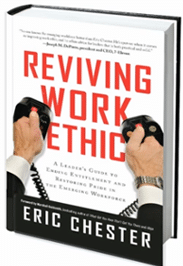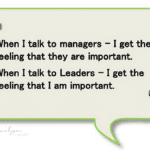Back in 1964, Supreme Court Justice Potter Stewart coined the expression “I know it when I see it” to describe his threshold test for pornography. I was reminded of the phrase recently (not in a conversation about porn) but in a discussion about work ethic. When asked to define work ethic, the person said, “I don’t know if I can describe it but I know it when I see it.”
Work ethic is an important subject. Companies want to hire people with a good work ethic. I’ve never seen an employment ad indicating the company requires a mediocre or poor work ethic. When managers tell me what kind of employees they want working at their organization, excellent work ethic always comes up.
But when I ask for a definition or specific examples of work ethic, I don’t get anything tangible.
Luckily, my friend Eric Chester has given us the answer. Eric has written a new book called “Reviving Work Ethic”. I’ve known Eric for many years and heard him speak a number of times (he’s a guaranteed Standing O at your next event).
 Reviving Work Ethic is all about defining the term and then having a deeper discussion about how to instill the concepts surrounding work ethic into employee conversations. Very important and useful stuff! While his focus is primarily on young professionals, I can see this applying to any generation.
Reviving Work Ethic is all about defining the term and then having a deeper discussion about how to instill the concepts surrounding work ethic into employee conversations. Very important and useful stuff! While his focus is primarily on young professionals, I can see this applying to any generation.
For example, one chapter of the book is devoted to having a positive attitude. Often cited as part of having a good work ethic – be positive. The chapter offers some history and research into why people aren’t positive (and why a negative attitude is perceived as “being cool”.) Then it shares leadership resources and tips to encourage positive behavior and engage in conversation about maintaining a positive attitude.
If you’re a manager looking for ways to explain work ethic to your employees, the book can give you some ideas. And if you’re an employee trying to find ways to articulate that you have a great work ethic, this might help you as well.
For more info about Eric’s Book “Reviving Work Ethic”, check out his website or visit his Facebook page. Be sure to tell him the HR Bartender sent you!







J. Thomas says
What I really like about this is defining work ethic not just as working harder – because there is WAY more to having a great work ethic than just being the one who stays late and works weekends.
JLC says
Cool review. Eric’s “up and over” concept is really meaningful to me. Also love J. Thomas’s comment (at The Center for Work Ethic Development, we say it’s not only working harder, it’s working with purpose).
Lesley says
I definitely agree with this blog post. While I had never thought about it before it makes sense how Lauby explains how someone described work ethic by stating, “I don’t know if I can describe it but I know it when I see it.” When I myself think about work ethic it is hard to describe to others; however, when someone has good work ethic it is very easy to detect. Work ethic is indeed important to have in any job!
Sharlyn Lauby says
Thanks everyone for the comments. I really enjoyed reading Eric’s book and think the topic of defining work ethic will be around for quite some time.
Michael Belk @workplace ethics says
A good work ethic will take you a lot further than laziness. A person is usually taught good work ethic by people they respect.
A father or mother figure is a good example of work in ethic in your younger years.
Great article.
abdi says
Reviewing on temperamental category and systemic for example pylagmatic, chloric,sanguine,melancholy.